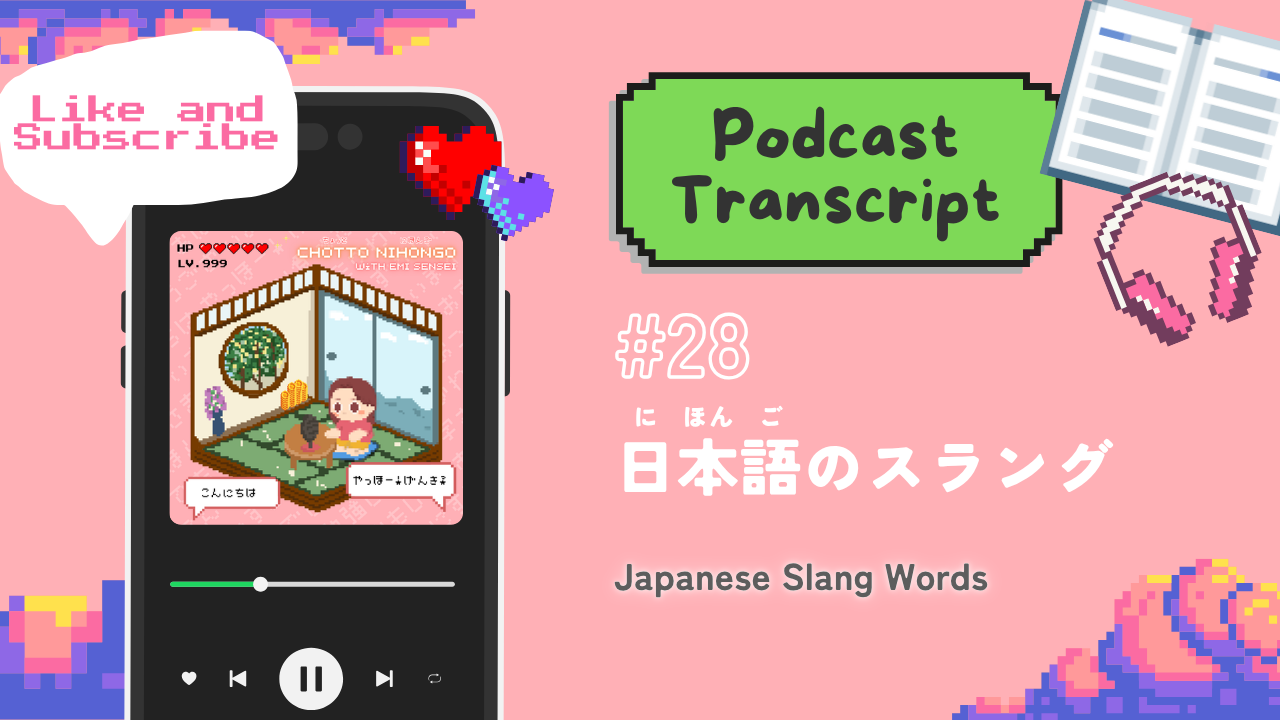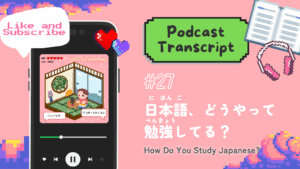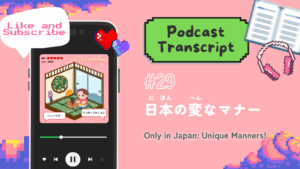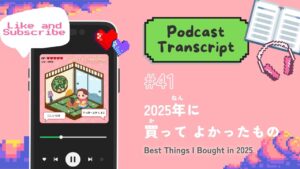おすすめの Google 拡張機能です!新しい言葉を勉強しましょう!
Here are the recommended Chrome extensions! Let’s learn new words here!
ポッドキャストプラットフォーム|Platforms of Podcast
こちらの記事は、配信中のポッドキャストのスクリプトです。
ぜひ、ポッドキャストを聞きながら読んでください。
 えみ先生
えみ先生もう聞いた人は、クイズをチェックしましょう!
ちょっとクイズ!|CHOTTO Quiz!
ポッドキャストを聞いた人は、ちょっとクイズを解いてみましょう。
むずかしいときは、下のスクリプトを読んで、もう一度クイズをチェックしてみてください。
【えいご】English Translation
Answer these quiz questions if you’ve listened to a new episode of my podcast.
If it was difficult, read the transcript below and try again.
❓ えみ先生は 今週どこに行きましたか?|Where did Emi-sensei go this week?
木曜日に、久石譲(さん)の ジブリフィルムコンサートに行きました。
She went to the Ghibli Film Concert by Joe Hisaishi.
❓ 「めっちゃ」は、どういう意味ですか?|What does “meccha” mean?
「めっちゃ」は、「とても」や「すごく」と おなじ意味です。
“Meccha” means the same as “Totemo” or “Sugoku” (Both mean “Very”).
❓ 「蛙化する」は、どんなときに使いますか?|When do you use this slang “Kaeru-ka suru“?
パートナーや 好きだった人が いやなことをして、急に好きじゃなくなったときに 使います。🐸
We (Most likely young people) use it when someone you liked does something off-putting and you suddenly stop liking them.
ポッドキャストのスクリプト|Transcript of Podcast
エピソード28、「日本語のスラング」
このポッドキャストは、初中級(Pre-Intermediate)レベルです。
おはようございます。こんにちは。こんばんは。
日本語の先生、エミです。
東京は、梅雨が終わりました。
梅雨は雨の季節ですね。
梅雨は よく雨が降っています。
でも、今年はそんなに降っていませんでした。
雨の日が少なかったです。
でも、私は今月 予定がたくさんあったので、晴れの日が多くてよかったです。
【えいご】English Translation
Good morning. Hello. Good afternoon.
I am a Japanese teacher, Emi.
The rainy season (tsuyu) is over in Tokyo.
Tsuyu is the season of rain.
It rains a lot during tsuyu.
But this year, it didn’t rain very much.
There were not many rainy days.
But I had many plans this month, so I’m glad there were many sunny days.
今週は、木曜日に久石譲のジブリフィルムコンサートに行ってきました。
久石譲さんはジブリの作曲家です。
作曲家は、曲を作る人です。Composerですね。
チケットを手に入れるのが本当に大変でした。
全然 手に入れられませんでした。
でも、やさしい人がチケットをくれたので、コンサートに行くことができました。
夫と いっしょに行きましたが、夫はジブリ映画が大好きなので とても感動していました。
私も感動しました。とっても よかったです。
みなさんの好きなジブリ映画はなんですか?
ぜひ教えてください。
【えいご】English Translation
This week, on Thursday, I went to Joe Hisaishi’s Ghibli film concert.
Joe Hisaishi is the Sakkyoku-ka for Ghibli.
A Sakkyoku-ka is a person who writes music.
In English, it’s called “composer.”
It was really hard to get tickets.
I couldn’t get any at all.
But a kind person gave me a ticket, so I was able to go to the concert.
I went with my husband. He really loves Ghibli movies, so he was very moved.
I was also moved. It was really wonderful.
What is your favorite Ghibli movie?
Please tell me.
ここで先週の質問をチェックしましょう。
先週は こんな質問をしました。
「好きな日本語のフレーズや おもしろいと思った言葉は ありますか?」
こんな質問でした。
【えいご】English Translation
Alright, now let’s check last week’s question.
Last week, I asked this question:
“Do you have a favorite Japanese phrase or a word you found interesting?”
That was the question.
今日のテーマは、最近の日本語のスラングです。
日本語では 若者言葉とも言います。
若者は、若い人です。
若い人が使う言葉は、若者言葉ですね。
最近、若い人たちは おもしろい言葉をたくさん使っていますね。
スラングとも言います。英語でもありますよね。
【えいご】English Translation
Today’s topic is recent Japanese slang.
In Japanese, we also say “wakamono kotoba” (words used by young people).
“Wakamono” means young people.
So, words used by young people are “wakamono kotoba.”
Recently, young people are using many interesting words.
This is also called slang. You have slang in English too, right?
カジュアルな言葉…、友達と話すときに使う表現です。
私はもう30歳ですから、ときどき若者言葉は むずかしいと感じます。
でも今日は10代のティーンエイジャーも使うし、私でも使うスラングについて話します。
ちなみに、よくSNSで Gen Zという言葉、聞きますよね。
Gen Zは日本語で Z(ゼット)世代と言います。
今日は、Z世代も使う、私も使うスラングについて話します。
【えいご】English Translation
The casual words—expressions used when talking with friends.
I’m already 30 years old, so sometimes I find young people’s words a bit difficult.
But today I will talk about slang that even teenagers use, and I also use.
By the way, you often hear “Gen Z” on social media, right?
In Japanese, Gen Z is called “Z sedai” (Generation Z).
Today, I’ll talk about slang used by both Gen Z and people like me.
最初に、とってもよく使うスラングを3つ紹介します。
この3つは若い人だけじゃなくて、30代や40代の人も使います。
1つ目の言葉は「めっちゃ」です。
聞いたことありませんか?
たとえば、
「このケーキ、めっちゃおいしい!」
「あの人、めっちゃかっこいい!」
と言います。
これは、「とても」とか「すごく」という意味です。
最初は、大阪の人がよく使っていました。
でも、今は ほかの場所でも みんなが使っています。
みなさんも使ってみてください。
【えいご】English Translation
First, I’ll introduce 3 very commonly used slang words.
These are used not only by young people but also by people in their 30s and 40s.
The first word is “meccha.”
Have you heard it?
For example:
“Kono keeki, meccha oishii!” (“This cake is really delicious!”)
“Ano hito, meccha kakkoii!” (“That person is looking really good!”)
This means “very” or “super.”
Originally, people from Osaka used it often.
But now, people all over Japan use it.
Please try using it too!
2つ目のスラングは「やばい」です。
これは、ちょっと説明が むずかしいです。
意味がたくさんあります。
たとえば、
「今日のテストやばかった。」
これはネガティブ、わるい意味で、英語のCrazyと似ています。
でも、
「このステーキ、やばい!」と言うと、ポジティブ、いい意味になります。
アニメやマンガでも、やばいという言葉は よく聞くと思います。
みなさんも、やばいを使って 文を作ってみてください。
【えいご】English Translation
The second slang word is “yabai.”
This is a little hard to explain because it has many meanings.
For example:
“Kyō no tesuto yabakatta.”
(“Today’s test was terrible.”) – This is a negative meaning, kind of like “crazy” in English.
But if you say:
“Kono suteeki, yabai!”
(“This steak is amazing!”) – It has a positive meaning.
You probably hear “yabai” a lot in anime and manga too.
Please try making a sentence using “yabai.”
そして3つ目は「エモい」です。
エモいは、英語の emotionalから来ています。
心が動いたとき、感動したときに、エモいと言います。
たとえば、古い写真を見て
「わ〜、エモいなぁ」というふうに言いますね。
なつかしい気持ちのときにも使います。
【えいご】English Translation
And the third word is “emoi.”
“Emoi” comes from the English word “emotional.”
When your heart is moved or you feel touched, you can say “emoi.”
For example:
When looking at an old photo, you can say:
“Waa, emoi naa.”
It can also be used when feeling nostalgic.
あと、ほかにも日本語のスラングには、短くした言葉が多いです。
たとえば、「とりま」
聞いたことありますか?
【えいご】English Translation
Also, many Japanese slang words are shortened.
For example, “torima.”
Have you heard it?
「とりま」は、「とりあえず、まぁ」を短くした言葉です。
「とりあえず」は、for now、「まぁ」は、Well、
たとえば、
「とりま コーヒー飲もう」は、「まずコーヒー飲もう」という意味です。
ほかにも短いスラングの言葉があります。
【えいご】English Translation
“Torima” is a short version of “toriaezu, maa.”
“Toriaezu” means “for now,” and “maa” means “well.”
For example:
“Torima koohii nomou.”
(“For now, let’s have some coffee.”)
There are many other short slang words:
「レベチ」
わかりますか?
これは「レベルが ちがう」の短い言葉です。
Another levelです。
「あの歌手はレベチ」
とか
「このハンバーガー、レベチでやばい」
も言うことができますね。
【えいご】English Translation
“Rebechi” = “reberu ga chigau” (a different level / on another level)
Examples:
“Ano kashu wa rebechi.”
(“That singer is on another level.”)
“Kono hanbaagaa, rebechi de yabai.”
(“This burger is next level and amazing.”)
ほかにもたくさんあります。
ググる:to Google
パニクる:to be panic
デコる:to decorate
こんな感じで、英語の言葉の最後に「る」で、動詞になるんです。
おもしろいですよね。
【えいご】English Translation
Here are some more slang verbs:
- “Guguru” = to Google
- “Panikuru” = to panic
- “Dekoru” = to decorate
They turn English words into verbs by adding “-ru” at the end.
Interesting, right?
そして、私がよく使うスラングが 1つあります。
それは
「一生〇〇してる」です。
「一生」はfor the whole timeという意味ですが、スラングで使うと「ずっと」という意味になります。
【えいご】English Translation
And there’s one slang phrase I use a lot:
That’s
“Isshou 〇〇 shiteru.”
“Isshou” normally means “for the whole life,” but in slang it means “all the time.”
たとえば、
「一生スマホ見てる」
「一生ラーメン食べたい」
「一生ジブリの曲聴いてる」
私は、よく使ってしまいます。
みなさんも よく使う日本語のスラングありますか?
教えてください。
【えいご】English Translation
Examples:
“Isshou sumaho miteru.” (I’m always on my phone.)
“Isshou raamen tabetai.” (I always want to eat ramen.)
“Isshou Jiburi no kyoku kiiteru.” (I’m always listening to Ghibli songs.)
I use it often.
Do you have any Japanese slang you use often?
Please let me know!
そして、私はあんまり使ったことがないんですけど、最近のスラングで「蛙化する」という言葉があります。
これは、彼氏・彼女などのパートナーや、好きな人が いやなことをした時に使います。
小さいアクションだけど、すごく嫌なことがあって、好きじゃなくなるときに使います。
「蛙化する」と言います。
【えいご】English Translation
There’s also a slang word I don’t use much, but I’ll introduce it:
“Kaeruka suru” (literally “to turn into a frog”).
This is used when your partner or someone you like does something unpleasant, and your feelings change suddenly.
It means you stop liking them over a small action.
You say “Kaeruka suru.”
たとえば、
「デート中に、彼氏が変な笑い方してて 蛙化した」
みたいな使い方です。
英語だと、the ickですね。
蛙化は、the ickという意味です。
【えいご】English Translation
For example:
“Deeto chuu ni kare ga hen na warai kata shite kaeruka shita.”
(“During the date, my boyfriend laughed weirdly, and I got the ick.”)
In English, this is called “getting the ick.”
“Kaeruka” = the ick.
ほかにも、まだまだありますよ。
若い子たちは、いろいろな言葉を短くしています。
ちょっと考えてみてください。
【えいご】English Translation
There are more slang words, too.
Young people shorten many expressions.
Let’s think about some:
たとえば、1つ目「バ先」
これ わかりますか?
「バ先」
「バ」と「先」この2つの言葉が短くなった言葉です。
「バ先」は、「バイト先」という意味です。
アルバイトの場所の意味ですね。
【えいご】English Translation
For example, the first one is “Basaki.”
Do you know this?
“Ba” + “saki” = “baito saki” (part-time job location)
ほかにも、
ドラスト:ドラッグストア
インライ:instagramのライブ
タイパ:タイムパフォーマンス
聞いたことがある言葉、ありましたか?
たくさん短い言葉がありますよね。
みなさんも聞いたことがあるスラング、ぜひ教えてください。
【えいご】English Translation
Other examples:
- “Dorasuto” = drug store
- “Inrai” = Instagram live
- “Taipa” = time performance (efficiency)
Have you heard any of these?
There are many short slang words.
Please share any slang you’ve heard too!
でも、スラングを使うときは気を付けましょう。
スラングは、とても おもしろい言葉ですけど、とてもカジュアルな言葉です。
友達と話すときはOKです。大丈夫です。
でも、仕事では全然使いません。
【えいご】English Translation
But be careful when using slang.
Slang is fun and interesting, but it’s very casual.
It’s okay to use with friends.
But not okay at work.
先生とか上司、先輩には使わないようにしましょう。
プライベートの時は…、まぁ大丈夫です。
でも、仕事のときは使わないようにしましょう。
TPO(Time, Place, and Occasion)を考えるのも大切ですね。
みなさんの好きな日本語のスラングも、ぜひコメントで教えてください。
【えいご】English Translation
Don’t use slang with teachers, bosses, or seniors.
In private conversations, it’s mostly okay.
But in work situations, don’t use it.
Think about TPO (Time, Place, and Occasion).
Please tell me your favorite Japanese slang too!
では、今日も みなさんに 質問があります。
「日本でびっくりしたマナーはありますか?」
日本は 歩くとき、食べるとき、電車に乗るとき、いろいろなマナーがあります。
みなさんは、日本に来たときに びっくりしたマナーはありますか?
ぜひ教えてください。
来週は、日本のマナーについて話します。
【えいご】English Translation
Now, I have a question for you today, as always.
“Did anything about Japanese manners surprise you?”
In Japan, when walking, eating, or riding the train, there are many manners.
Were there any manners in Japan that surprised you when you came here?
Please let me know.
Next week, I will talk about manners in Japan.
今日のポッドキャストのスクリプトは、私のウェブサイトにあります。
ウェブサイトは、 en-nihongo.com です。
よかったら、ポッドキャストの感想や、質問の答えをコメントで教えてください!
じゃあ、また来週のポッドキャストで会いましょう。
じゃあね~!
【えいご】English Translation
A transcript for today’s podcast is on my website.
The website is en-nihongo.com .
I’d be very happy if you could share your thoughts/impressions or could answer the question I asked in this episode!
I’ll see you in the next episode.
Jaa ne-!







コメント|Comment